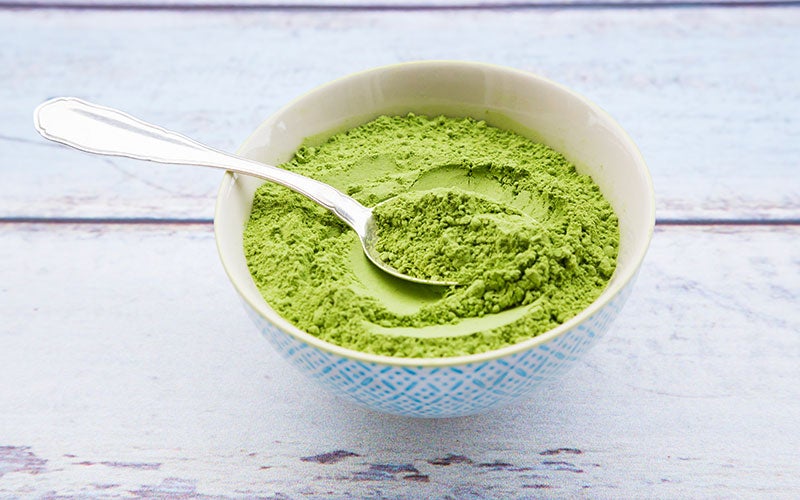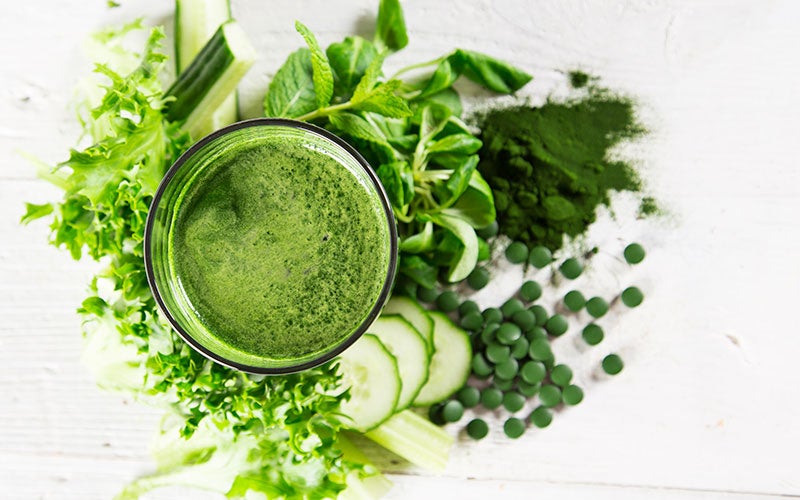Chlorella: Could this mighty green be your new favorite superfood?
 ©Westend61
©Westend61
Small, green, and mighty: chlorella has lots of proteins, antioxidants, and micronutrients said to have health benefits. No wonder it’s earned a reputation as a superfood! But what makes this microalgae so nutritious and how is it different from all the other superfoods?
What is Chlorella?
Chlorella is a unicellular alga that has been growing in fresh water for billions of years. There are more than twenty different species of chlorella algae around the world, but the most common is chlorella vulgaris.
The single-celled chlorella is so tiny that it can’t be seen with the naked eye. Because of its size, it’s easy to underestimate this microalga and overlook its high density of essential micronutrients, which is what makes it a popular dietary supplement.
Spirulina and chlorella are often confused with each other, but they’re actually pretty different. Spirulina alga belongs to the family of blue-green algae, which aren’t algae strictly speaking but a type of bacteria (cyanobacteria) instead. Spirulina is almost ten times larger than chlorella and grows in salt or brackish water.
Which Amino Acids Does Chlorella Have?
The protein power that can be packed into a tiny little cell is truly amazing: Chlorella is an excellent source of protein at 50 to 60 percent by weight, and containing all nine essential amino acids. These include leucine, valine, isoleucine, lysine, phenylalanine, threonine, methionine, tryptophan, and histidine. The body cannot synthesize these nutrients itself, which is why it needs to absorb them through food or supplements.
Just 1 gram of chlorella might help you cover all your essential aminos, as the following table shows (the exact specifications may vary depending on the manufacturer):
| amino acid | average concentration in 1 gram of Chlorella algae | recommended daily intake per kilogram of body weight |
| leucine | 45 mg | 39 mg |
| valine | 31 mg | 26 mg |
| isoleucine | 20 mg | 20 mg |
| lysine | 49 mg | 25 mg |
| phenylalanine | 25 mg | 25 mg |
| threonine | 24 mg | 15 mg |
| methionine | 12 mg | 15 mg |
| tryptophan | 10 mg | 4 mg |
| histidine | 12 mg | 10 mg |
Why are proteins so important? Proteins are our body’s building materials and essential for all repair and growth processes, including muscle growth, hair growth, and the formation of cartilage and bone tissue.

Health Benefits of Chlorella – Vitamin B12
At around 100 micrograms per 100 grams, chlorella contains a particularly high amount of bioavailable, i.e. easy for your system to use, B12 (cobalamin), which is otherwise only found in animal-based foods. With just one daily dose of the algae in a supplement, you take in about 3 to 10 micrograms of B 12. For comparison’s sake, according to the NHS, the daily reference intake of vitamin B 12 is 1.5 micrograms.
Alga is one of a few plant sources of vitamin B 12; sauerkraut, fermented soy products, shiitake mushrooms, and root vegetables may also contain traces of this important B vitamin. If they aren’t paying close attention to their food, vegans in particular may benefit from supplementing their diet with chlorella tablets.
But that’s just one of the many important micronutrients in these little cells:
- Vitamins and minerals: In addition to being a good source of vitamin B 12, chlorella also contains the immune booster vitamin C, as well as vitamins A, D, E and K. It also boasts calcium, magnesium, potassium, and sodium, as well as the trace elements iron, zinc, manganese, copper, and selenium.
- Antioxidants: Chlorella contains the compounds chlorophyll, vitamin C, beta carotene, lycopene, and lutein, which can bind harmful substances in your bloodstream.
- Omega-3 fatty acids: Chlorella is 5 percent fat, and those are all omega-3 fatty acids.
What’s the secret? Chlorophyll!
The name chlorella is made up of the Greek words “chloros,” meaning green, and “ella,” meaning small. This microalgae owes its striking deep color to its chlorophyll – a natural pigment formed by plants during photosynthesis.
At up to 4 percent of its weight, the chlorophyll concentration in chlorella alga is higher than in any other plant.
What makes the plant pigment so important for humans? Chlorophyll is also called “green blood” because its structure is almost identical to that of the human blood pigment hemoglobin. That’s why chlorophyll can take on important roles in the body, helping hemoglobin do its job, for example, transporting oxygen to your cells so they can convert food into energy. That’s why taking chlorella may also increase athletic performance.
Other possible health benefits of chlorella supplements due to their high percentage of chlorophyll:
- It may bind toxins and support detoxification processes, as some studies have shown.
- Chlorophyll has an alkaline effect and can contribute to a good acid-base balance.
Chlorella Does Not Replace a Balanced Diet
Chlorella vulgaris packs a real protein and vitamin punch, so it’s no wonder the alga is touted as a superfood. Taking chlorella powder or tablets may help balance out your nutrients, lower blood pressure, help during pregnancy, support your immune system (according to some studies), and promote overall health. Just remember to only take small doses of this micro super alga. Approximately 3 to 10 grams of chlorella are recommended per day.
Your system can only absorb low concentrations of the alga’s micronutrients when supplementing, which means the rest passes through without causing harm, but also not necessarily helping. For example, other studies have shown that a chlorella supplement has no positive effect on the immune system in healthy adults.
Like with all other supplements, it’s important to not rely fully on this superfood for all your nutritional needs. It does not replace a balanced diet with all the essential macro- and micronutrients that come with it. Need a refresher on what makes a diet balanced? Check out our article on balanced nutrition!
Conclusion
- Chlorella is a microscopic, single-celled organism classified as a freshwater alga.
- Because of its high concentration of vitamins, minerals, and antioxidants, chlorella is considered a superfood.
- Chlorella might have many positive effects on your health because it’s particularly rich in chlorophyll, which is said to support your energy metabolism and have an antioxidant effect.
- Chlorella alga is up to 60 % protein and has plenty of B12.
- Chlorella supplementation cannot replace a balanced diet in combination with a healthy lifestyle.
Sources for this article
We at foodspring use only high-quality sources, including peer-reviewed studies, to support the facts within our articles. Read our editorial policy to learn more about how we fact-check and keep our content accurate, reliable, and trustworthy.
- World Health Organization (2007): Protein and amino acid requirements in human nutrition. Report of a joint FAO/WHO/UNU expert consultation (WHO Technical Report Series 935) https://www.who.int/nutrition/publications/nutrientrequirements/WHO_TRS_935/en/
- DGE (Stand 28.01.2021): Neuer Referenzwert für die Vitamin-B12-Zufuhr https://www.dge.de/presse/pm/neuer-referenzwert-fuer-die-vitamin-b12-zufuhr/
- Joana Silva et. al. (2019): Chlorella https://www.sciencedirect.com/topics/agricultural-and-biological-sciences/chlorella
- InyeongLee et. al. (2015): Detoxification of chlorella supplement on heterocyclic amines in Korean young adults https://www.sciencedirect.com/science/article/pii/S1382668914002853?via%3Dihub
- Jung Hyun Kwak et. al. (2012): Beneficial immunostimulatory effect of short-term Chlorella supplementation: enhancement of Natural Killer cell activity and early inflammatory response (Randomized, double-blinded, placebo-controlled trial) https://www.ncbi.nlm.nih.gov/pmc/articles/PMC3511195/
































